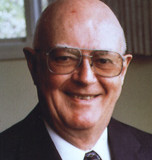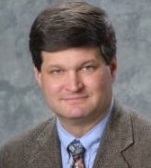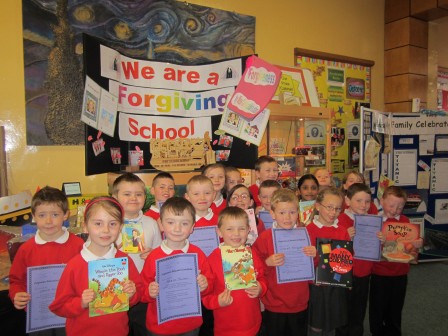Tagged: “Children”
Can you give me some pointers for bringing forgiveness into my family?
Yes, please consider three ideas.
First, you can be aware of what I call “teachable forgiveness moments.” For example, suppose you are watching a film in which revenge is occurring. You could ask, after the film is over, “How might the story have continued if the one on whom revenge was sought decided to forgive and then seek justice in a reasonable way?”
Second, you could have a regular conversation, say once a week, at mealtimes in which you ask, “How did it go for you today? Were there any challenges? Did you consider forgiving under those circumstances?”
Third, you might consider sharing your own experiences, at least on occasion, in which you had to forgive someone at work or in some other context. The point is not to pressure family members to forgive, but to show them the way by your example.
Learn more at Family Forgiveness Guidelines.
Can We Get Anti-Bullying Programs to Work?
In an August 13, 2019 essay at mercatornet.com, author Izzy Kalman states that the anti-bullying movement is doomed to failure. This is the case because, in his words: “The goal of the anti-bullying movement is to convince us all to stop bullying or tolerating bullying. Unfortunately, the message falls on deaf ears because hardly anyone believes that they are bullies.”
In other words, those who bully are in denial and so attempts to convince them to change are futile. We are more hopeful of successful attempts at reducing bullying because of our approach, which, as far as we can tell, is unique.
Sometimes some students are so emotionally wounded that their anger overwhelms the attempt at consciousness-raising. The students are so very wounded that they cannot listen well. Some are so wounded that they refuse to listen. Even others are so mortally wounded that they find a certain pleasure in inflicting pain on others. It is when it gets to that point—others’ pain equals pleasure for the one inflicting it—that we have a stubborn problem on our hands. No signs, no consciousness-raising, no rally in the gym, no pressure to be good is going to work…..because the gravely wounded student is now beyond listening.
Yet, we have found a hidden way to reverse the trend in those who are so hurting that they derive pain from hurting others. It is this: Ask the hurting students, those labeled so often as bullies, to tell their story of pain, their story of how others have abused them.
You will see this as the rule rather than the exception:
Those who inflict pain over and over have stories of abuse toward them that would make you weep. In fact, we have seen the weeping come from the one who has bullied others, the one who has inflicted serious pain onto others. He wept because, as he put it, “No one ever asked me for my story before.” His story was one of cruel child abuse from an alcoholic father who bruised him until he bled. And no one ever asked him about this. And so he struck out at others. Once he told his story, he began to forgive his father and his pain lessened and thus his need to inflict pain on others slowly melted away.
This is what our Anti-Bullying Forgiveness Program does. It aids counselors and teachers in bringing out the stories in the pain-inflictors so that their own pain dramatically decreases. As this happens, through forgiveness, bullying behavior is rendered powerless……because in examining their own hurt they finally realize how much hurt they have inflicted…..and with their own emotional pain gone, they have no desire to live life like this any more.
Come, take our anti-bullying curriculum and save the life of at least one child and help prevent inflicted pain on countless others.
Robert
EDITOR’S NOTE: For a limited time only, the International Forgiveness Institute is offering Dr. Enright’s Anti-Bullying Forgiveness Program as a free gift to counselors, schools, and families. Click here to order.
Learn More:
- A New Approach to School Bullying: Eliminate Their Anger
- Solution to Rampant Bullying–Forgiveness Education
- We Must Treat the Cause and Not Only the Symptoms of Bullying
- Adverse Impacts of Childhood Bullying Extend Into Adulthood
Reflections for the 25th Anniversary of Our International Forgiveness Institute, Inc.
It was the early 1990’s and I just recently did an interview for a Chicago newspaper. The journalist published my home telephone number within the article. For the next two weeks, it seemed as if the phone just would not stop ringing. The people who called were seeking information about how to forgive. “There is a genuine hunger out there for people to know how to go about forgiving,” was my conclusion to family and colleagues.
about how to forgive. “There is a genuine hunger out there for people to know how to go about forgiving,” was my conclusion to family and colleagues.
Because we had published the first-ever empirical article on forgiveness in a peer-reviewed journal article only a few short years before this, in 1989, there was little out there instructing people on how to forgive those who have deeply hurt them. Because of the ground-breaking work of Msgr. John Hebl, with whom I had the honor of publishing the second-ever empirical article on forgiveness in a journal, in 1993, there was emerging scientific support for our Process Model of Forgiveness.

William Walker
About this same time, the late and great Dr. William Walker of Madison, who ran radio stations, wrote a letter to me (email was not big yet). He explained that many years ago, he received his doctoral degree from the Department of Educational Psychology at the University of Wisconsin-Madison, where I was (and am) a professor. Dr. Walker explained to me that he was drawn to our forgiveness work, had the financial means to bring this to an important level, and he had an interest in joining the research. I enthusiastically agreed and a strong collegial relationship and friendship developed.

Tom Walker
When my dear friend William passed away, his son Thomas Walker took up the cause and provided the necessary funding to keep the IFI viable and expanding, as he does to this day.
Thank you, William and Thomas!
Given that we were getting some financial support and the many requests for forgiveness information continued, some of my colleagues and I decided to try to form an entity with the goal of serving people who wanted information on how to forgive. This was to start as a service entity for all who were interested in forgiving.
Our little group decided to take the non-profit route and developed the 501(c)3 entity, the International Forgiveness Institute, Inc. (IFI) in Madison, Wisconsin in 1994. A Board of Directors was formed to help guide the development of this organization. Thank you, Board Members, for your dedicated service to our IFI! At the time of its formation there was nothing “international” about this organization. Yet, it was the vision, the promise of such expansion, that led to our keeping that word “International” in the title. We, of course, started small, without even a website.
International Forgiveness Institute, Inc. (IFI) in Madison, Wisconsin in 1994. A Board of Directors was formed to help guide the development of this organization. Thank you, Board Members, for your dedicated service to our IFI! At the time of its formation there was nothing “international” about this organization. Yet, it was the vision, the promise of such expansion, that led to our keeping that word “International” in the title. We, of course, started small, without even a website.
A major turn occurred for us at the beginning of the 21st century. Because our work was having success in the mental health field with our Process Model of Forgiveness, I had an idea: Why not start to introduce forgiveness to children and adolescents? After all, if they will experience injustices, perhaps even severe injustices in this world, why not equip them with the scientifically-supported approach of forgiveness to reduce the resentment, caused by the injustices, so that they can be resilient in their emotional well-being and in their healthy family interactions?
With the idea of prevention in mind, we decided to build forgiveness curricula for children, starting in first grade (age 6 and 7). We did so through age-appropriate children’s stories, such as Dr. Seuss’ Horton Hears a Who. The children, in their own classrooms, then begin to see what forgiveness is, how story characters navigate interpersonal conflict, and what happens when people forgive. We piloted this curriculum for the first time in Belfast, Northern Ireland, did the research on this endeavor through the university, and published the first empirical evaluations of this work in 2007.

Primary 3 students at Holy Family Primary School in Belfast celebrate their “Forgiveness Graduation.”
The results were dramatic! Children, upon hearing stories and reflecting on the theme of forgiving, actually reduced in their own anger. Teachers saw greater cooperation among students in classrooms and teachers reported to us that they, themselves as teachers, improved in their own teaching skills as a result of being a forgiveness instructor.
The Forgiveness Education project grew to such an extent that we now have a complete set of curriculum guides from pre-kindergarten (age 4) all the way up to the end of high school (age 18), including an anti-bullying guide and two guides for parents: A Family Guide (for those with primary-aged children) and Strengthening Families (for those with middle-school aged children). Dr. Jeanette Knutson, Amber Osmulski, and Dr. Matthew Hirshberg helped to craft these guides. Thank you, Jeanette, Amber, and Matthew!
 The Forgiveness Education curriculum guides have been ordered by educators from over 30 countries across the world. Other international endeavors include both the Jerusalem Conference on Forgiveness and the Rome Conference on Forgiveness and a new Forgiveness Education initiative in Bethlehem in the Middle East. Thank you, Mr. Thomas and Terri Lucke, for your generous funding! We now, I think, have earned the word “International” in our organization’s title.
The Forgiveness Education curriculum guides have been ordered by educators from over 30 countries across the world. Other international endeavors include both the Jerusalem Conference on Forgiveness and the Rome Conference on Forgiveness and a new Forgiveness Education initiative in Bethlehem in the Middle East. Thank you, Mr. Thomas and Terri Lucke, for your generous funding! We now, I think, have earned the word “International” in our organization’s title.
Our long-time Director at the IFI, Dennis Blang, has been instrumental in sending far and wide information about the Forgiveness Education guides, in maintaining our website, publishing the Forgiveness News, crafting the electronic newsletters, and overseeing the everyday important activities of our institute. Thank you, Dennis! And thank you to our earlier Directors, Dr. Gayle Reed and Mary Mead!
The service work has expanded so that we now are serving homeless people, those in prisons, and we have started a bumper-sticker campaign, “Drive for Others’ Lives” as a way to help make the roads a more civil environment. Many of these new ideas come from our stellar volunteer at the IFI, Jacqueline Song. Thank you, Jacqueline!
A big thank you goes out to our long-term President, Roy Lloyd, and to our Ethics Committee members for their dedicated work in examining our protocols that impact the homeless, those in prison, and others. Thank you to those “on the ground” who oversee important forgiveness programs in Belfast (Leah Judge), Greece (Dr. Peli Galiti), and Monrovia, Liberia (Rev. Kortu Brown and Mr. George Cooper). We want to thank all who have financially contributed to our efforts over this quarter-of-a-century.
 We started with one idea: Forgiveness is important as it can quell unhealthy anger and improve mental health and relationships. Many are catching on to this idea. In our humble opinion, forgiveness should now become a natural part of families, schools, organizations, and individual hearts for the good of humanity.
We started with one idea: Forgiveness is important as it can quell unhealthy anger and improve mental health and relationships. Many are catching on to this idea. In our humble opinion, forgiveness should now become a natural part of families, schools, organizations, and individual hearts for the good of humanity.
Long live forgiveness!
Robert
This 3-Year-Old’s Explanation of Forgiveness is Simply Brilliant!
Kids say the darnedest things. But when 3-year-old Holland, the daughter of blogger Mary Katherine Backstrom, explained what “forgiveness” means, she did it in a beautifully heartfelt and simplistic way. And while kids are known for their outlandish statements (seriously — where do they hear these things?!), this little girl happened to be pretty accurate with her definition, single-handedly reminding us all to soften our hearts a little more often.
Should you wait for the offender’s apology before forgiving?
If you wait for the other to apologize, what does that do for your own freedom as a forgiver? You are trapped—trapped—in unforgiveness until the other apologizes. So, unconditional forgiveness (not needing an apology) sets you free to forgive whenever you are ready. We need forgiveness education so that children can begin to think about this important issue and other important issues that will aid their forgiving and aid them in growing as persons.
For additional information, see What is Forgiveness?

 Dr. Robert Enright, founder of the International Forgiveness Institute and the man Time magazine called “the forgiveness trailblazer,” has authored more than 60 forgiveness-related blog posts for
Dr. Robert Enright, founder of the International Forgiveness Institute and the man Time magazine called “the forgiveness trailblazer,” has authored more than 60 forgiveness-related blog posts for 

